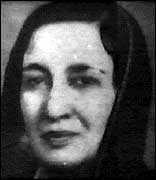Begum Jahanara Shahnawaz
| Jahanara Shahnawaz | |
|---|---|
 | |
| Born |
April 7, 1896 Lahore, British India |
| Died |
1979 |
| Nationality |
|
| Occupation | Politician |
| Known for | Pakistan Movement |
Begum Jahanara Shahnawaz (1896–1979) was a politician in British India and in Pakistan. She was the first woman to preside over an Asian legislature.
Muslim League and Partition
In 1935, she formed the Punjab Provincial Muslim Women's League. In 1937, she was elected a Member of the Punjab Legislative Assembly and was appointed Parliamentary Secretary for Education, Medical Relief and Public Health. In 1938, she formally joined All India Muslim League and was inducted in the Woman's Central Sub-committee.
In 1942, the Government of India appointed her as a member of the National Defense Council. She refused to abide by Jinnah's call to resign from the league and was expelled from the party. In 1946, she was again elected a Member of the Punjab Legislative Assembly. Along with Mirza Ahmad Ispahani, she were sent on a goodwill tour to the United States of America to campaign for Pakistan.
In 1947, she played an important role in the Muslim League’s civil disobedience movement against the Punjab government, getting arrested along with other leaders of the Punjab league. Under the terms of the Cabinet Mission Plan, she was elected a member of the Constituent Assembly of India. However, like most Muslim League members she did not take her seat and left for Pakistan.
Pakistan
She and Shaista Ikramullah were the only two women in the Pakistan Constituent Assembly and Central Legislature. She was noted for her opposition to Sardar Abdur Rab Nishtar's proposition that Pakistan be an Islamic country, arguing that Jinnah envisaged it as a secular state.
Post independence, she remained active in public life in Pakistan. She was one of the founders of the All Pakistan Women's Association which was active in women's rights. She, along with Begum Rana Liaquat Ali Khan, were instrumental in pushing for reforms in family law. She was one of three women appointed to the Commission on Marriage and Family Law Reform, 1954. The Commission submitted its report in 1958 by suggesting various reforms to the existing laws governing marriage, divorce and provision of inheritance to the orphaned grandchildren. The recommendations were duly incorporated through the adoption of the Muslim Family Law Ordinance 1961. This helped in restricting polygamy, and ensuring that women were guaranteed their rights as was promised in the Quran.
Prime Minister Zulfikar Ali Bhutto even considered appointing her President of Pakistan.
Literary work
Begum Jahanara Shah Nawaz wrote several pamphlets on educational and social matters. She wrote a book titled Husn Ara Begum in Urdu and her memoirs titled Father and Daughter in English.[1]
See also
References
- ↑ Father and Daughter: a political autobiography. Lahore: Nigarishat, 1971. Also: Karachi: Oxford University Press, 2002 0195796462
External links
| Wikimedia Commons has media related to Begum Jahanara Shahnawaz. |